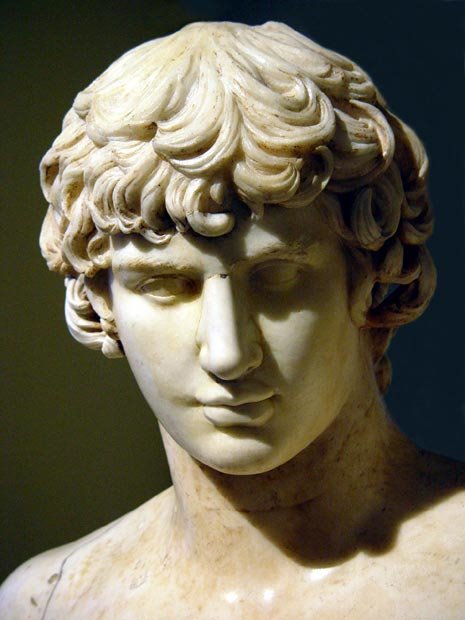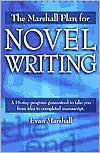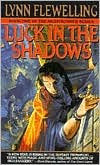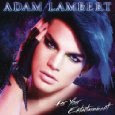Monday, August 28, 2006
Festina Lente
"Festina lente", for anyone not familiar with the Latin quote, means "Make Haste Slowly". It describes my current work on Chapters 4 and 5. I'm so eager to put them behind me and get on to the remaining chapters and to FINISH this editing so I can start SHOPPING the completed manuscript around! But I have to be patient and make my progress at the rate that is necessary to accomplish the work I have to do.
I'm taking time to do more "ruminating" on the story, some of the deeper thinking and dreaming that I really didn't take the time for back in the Autumn when I was dreaming up and planning this story. I took a month (October) and worked nearly full-time on planning this novel then, but still I needed more time to really explore the possibilities -- it's a rich story.
I built a very solid foundation last Fall, and have added to it in the months since, but now that I am editing I know there are some unanswered questions, some areas of potential that I really must explore in order to make this the best story it can be. I'm enjoying this in part, and seeing clearly the importance of it, but still I find myself chronically impatient, wanting to leap ahead when I really just need to walk along slowly and smell the roses along the way, and discover some new things that I hadn't noticed before while traveling the terrain of the story.
The positives have been rewarding. I have enjoyed adding a number of little bits into existing scenes in the first 5 chapters (yes, although I'm focusing on 4 and 5 right now, I still go back over 1-3 as well from time to time). Little ideas that draw out more depth, show more detail of the characters, their situations, their personalities, the choices they have to make or how things impact them. Sometimes it's just a line or two of dialogue, or an extra sentence added to an existing line of dialogue.
In Chapter 4, I've added one whole scene that has been wonderful, and which has grown considerably in what it covers. It's about 2,500 words long now, and adds much depth to the main character, his love interest, and the main plot questions. Both his internal and external plot questions come to the fore in this scene, making it a good transition from Act I to Act II.
The editing is helping me reshape the existing material, and bring it into much sharper focus. I'm really excited to see how sharply the story can be focused. This is the first time I've worked with a 120k-word manuscript, and it's a lot of material to keep in mind and keep track of, but it's not too much. Still, finding clarity when working with so much material is very gratifying. I always know and never doubt I have an excellent plan -- my 12-step outline has worked very, very well for me and has held up over the months no matter how much I rework, tweak or add to the story.
Chapter 4 is almost done now. I just need to go over the new scene a few more times to make it flow smoothly, and to add one more bit of information as part of the focusing I mentioned. That will occur in pieces in a few interactions over the remainder of the chapter, and then come into sharp focus in the very last scene. For anyone not familiar, my chapters in this novel run around 10,000 words and contain multiple scenes (3-6 scenes per chapter). There is really little left to do with 4 except minor tweaking.
Chapter 5 may end up being changed more. I've already gone through it in the editing, but now I have more ideas for what to do with it. There is a lot of potential there and I don't feel I've realized enough of it yet. The last scene was always the challenging one, and adding the poem and quotes to the story has helped me remove the excessive info dump there, but still that scene will need more work. I completely rewrote it several times back in the winter when first working on it, and it may take a few more times to get it right. I see some possible new scenes to draw out more aspects of the overall experience and conflict that this chapter presents in the plot. I look forward to seeing just which scenes I end up with, since some of them could be really fascinating. The conflicts here are related to larger conflicts later, although not directly, but it's important to set up the climax of the book in Chapters 5 and 6.
I finished "Sometimes the Magic Works" and will comment on it in my next posting. Good book!
Well, getting back to work!
Adrian
Tuesday, August 22, 2006
Interesting Blog Postings
I've found some new blog sites to visit, and will update my links to other authors' blogs in the coming days. I wanted to share links to a few specific blog postings I've read in the past week, in case they are of interest to others who visit my own blog.
The reason these postings seemed interesting to me at this time is probably that I am in the middle of editing THE REFLECTING STONE and, for a lot of writers, the middle of anything seems a hard place to be (reminds me of a joke a famous drag queen told me once, but perhaps I'll choose not to post it here).
This posting is from a recently published author who writes about "The Great Divide" that separates the published from the unpublished, and how she feels now that she has crossed it. Fascinating!
This blog currently has a couple of recent postings ("Discipline, Deadlines and Creativity" and "Going Hollywood") about the importance of discipline, of keeping at it, and how deadlines can help that (as well as collaborative vs. individual writing projects).
Finally, this posting on a literary blog mentions a renaissance in gay fiction, saying that some of the most exciting writing in America these days is being done by gay authors. Whether that's true or not, it sounds encouraging to an aspiring gay writer.
I could not find a copy of Terry Brook's book on writing, "Sometimes the Magic Works", which was recommended to me not long ago. I managed to reserve a copy through the library. The copy has come in, so I'll be picking it up and reading it over the coming week. I read reviews of it on Amazon. I remember reading "The Sword of Shannara" many years ago and putting it aside -- it was too boring! I think I was so spoiled by "The Lord of the Rings" that anything else would have disappointed me. I would be curious to check out his writing again now and see whether my response to it is different. I seem to remember that I couldn't seem to care about his characters or their goals. Probably I just wasn't "into it" at the time. It's amazing to read the reviews of different books on Amazon (or other booksellers' sites). Some people just love something to death, and others can't stand it. Tastes vary!
Keeping at the editing, feeling very happy with the recent progress. Laying a solid foundation in the current work (Chapters 4 and 5) for many scenes I know they tie into in later chapters.
Adrian
Saturday, August 19, 2006
"Aha!"
The past few days I've continued work on my alternate strategey, the one that is helping me avoid the info dump in Chapter 5. It's a simple strategy, one that is very common in the Fantasy genre, but I was trying to avoid it, probably since it is so common in the Fantasy genre.
I created a poem to appear at the beginning of the book, prior to the first chapter, an excerpt from an ancient text that tells something about the world of the story. This allows me to tackle that information head-on, set the tone for the story, and do it in only one page, rather than 5 pages of bloated dialogue and intervening gesticluations (aka "info dump"). I saw no way not to provide this information -- the reader needs to understand the history of the world, the context that the characters are living in -- and it's involved enough that it needs to be handled outright.
I've been able to avoid other info dumps by breaking the info down to what was absolutely necessary and embedding it as a phrase here, a sentence there, in various places, sometimes scattered over several chapters, so it's not really noticebable to the reader yet the reader is given the background info that is helpful and necessary to understanding the story.
This initial poem is not "too much". The reader needs only pause a moment to enjoy it. It is interesting in its own right, and it lets the reader get the key information in the most concise and interesting way possible then get right into the story. Also, it raises the primary story question very neatly and at the very outset.
While writing, rewriting and tweaking this poem, I have also hit paydirt, so to speak, one of those "AHA!" moments that makes you shudder as a writer and think "Golly, maybe this story really is worthwhile after all!". I was finally able to get substantial clarity on the dynamic that drives this world, and how the main character stands in relation to it. To the writer, stories are constructed layer upon layer, and there is a sense at times there is a murky or foggy expanse in front of you and you know what's in it, what's on the other side, but still you can't quite see it for yourself as clearly as you'd like to. I've been struggling for months and months to get this clarity on this fundamental relationship between the main character and the world he inhabits, and now I have it! Down to a tiny little point, barely a pin-prick in size! 120,000 words of information in this story (give or take), and it comes down to something as focused as that. That's clarity! It feels great to finally "get" my own story, in a sense.
Writing the poem also helped me simplify the mythology, something I had been trying to find a way to do for some time. I'm happy that issue is finally cleared up.
Writing the poem has also led me to a structural technique that not only reinforces the story idea, but also raises suspense chapter by chapter, and much more as the story progresses: I'm putting a very short quote from another ancient text before each chapter. This stuff isn't heavy, unfathomable, and hard to relate to the story. Quite the opposite. Each quote connects very directly with the emerging context of the story, and is focused very clearly on the chapter ahead. It doesn't give anything away that wouldn't be guessable already, and heightens suspense.
Seeing how well this new layer of information worked when woven into the story, I decided to take advantage of a structural break at the mid-point of the story, where I put another longer excerpt from yet another ancient text, preparing the reader for the second half. It greatly raises interest by introducing new information at that point, since the stakes have just been raised considerably, and the reader really won't know what's going to happen next, yet some background is in order. Again, not giving anything away, just "versing" the reader in the world of the story so when things do happen, they will make more sense.
I think the excerpts and quotes are not overwhelming, are balanced very nicely, and contribute a lot. I'm still not sure how exactly things will run with the quotes in the second half of the story. I haven't written them yet. I'll work that out as I go, but I have a pattern established now that carries me through the first half of the novel. I have the first six quotes, even though I haven't edited Chapter 6 yet. Nonetheless, it's clear to me what I want out of this pattern as the story progresses through the second half.
Back to the editing....
Adrian
Wednesday, August 16, 2006
2 Reasons to Be Happy
Considering the neverending struggle which is novel writing, it is important to find whatever causes for JOY you can along the way, to keep the process from being or becoming total drudgery. Toward that end, as I continue editing Chapters 4 and 5, I have recently found two reasons to be happy!
1) I finally wrote that scene from Chapter 4 that I felt needed to be there. It allows the main character to do some "reacting" and planning with another major character, rather than alone. It works very well, and is much better. I'm really happy with this improvement. It makes for a much stronger progression in the plot.
2) I finally hit on an excellent way to avoid the nasty info dump that I have at the end of Chapter 5. Oh, it's terrible! Grown men have jumped screaming from the decks of ocean-going vessels with far less cause than reading this nasty info dump. It is so large, the UN recently petitioned me study its impact on third-world countries, considering how Americans like to use the rest of the world as a dumping ground. (I wrote back and told them I was keeping it all in my own backyard at this time but would study the potential for widespread negative impact before releasing it into the environment.) Suffice it to say, using this excellent alternative method works so well that not only am I happy, but my main character is happy, too, since he no longer has to sit through it!
Yes, the work goes on!
Adrian
Saturday, August 12, 2006
Editing Chapters 4 & 5
I really appreciate the comments to my last post. It always makes my day when someone takes the time to post a comment. I get a lot of encouragement from that. I think it helps, just knowing there are others out there who are going through the same kinds of experiences in their own writing, and that I am not alone in this work.
With the summer weather, I have found it hard to devote as many hours to my writing as I did during the winter and spring. This past week, again, the work dwindled down to a nominal amount, which I really don't like to see. At least I am keeping at it as best I can under the circumstances.
I spent more time on Chapter 4, although I have not yet rewritten that reaction scene, and then several days on Chapter 5, which is very lengthy. I finally started making notes/corrections/changes on the hardcopy printout for Chapter 5. This is something I did a lot of in past years with other novels, and it felt very familiar to me. I agree that we see so much more and see it so much more clearly when we edit in hardcopy. I still like the idea of editing on the computer at first, but at some point it needs to be printed out and done the "old-fashioned" way. It does make a difference.
TIP: I put a checkmark in the upper right corner to indicate if there are any changes on a page. That way, when I'm hurrying through pages later to enter the changes into the computer, I don't miss a page if there is a minor change somewhere on the page that might not be so obvious.
I have now hit the threshhold where the existing draft begins to weaken. The first few chapters are very strong as written, but by Chapter 5 things begin to become bloated, or rambling, to some degree. Not really "rambling", with all that word implies. Perhaps "bloated" is better. A little too much attention given to some things that aren't really that important. Probably that was just my way of trying to find what was important, working through in detail, searching out the next significant moment. The editing thus far has been fairly superficial. I want to make those changes, print the chapter out again, then see what I can do to make it even tighter. Maybe I can knock out several thousand words, cut a minor scene or two.
It will only get more challenging as I continue from this point, since I know the later chapters were rough in comparison with the early chapters. Nonetheless, I do have a sense of what I want them to be, so I just have to keep that in mind as I go over things, and not be afraid to cut-cut-cut and chop-chop-chop and even rewrite a scene or two from time to time.
In the writing phase I found I would cycle between "I love this!" and "I hate this!" in regard to what I had written. In the editing phase, I think the same oscillations are occurring. It's hard to maintain objectivity. That's okay. I know how to "fly by my instruments" by now. I try to keep my focus on my vision of the finished product, which I see as being of good quality and worth reading for the reader.
Having never edited a full-length manuscript before, I'm just winging it. The book I've been referring to recently, THE MARSHALL PLAN, has been an excellent source of what not to do in prose. The author gives concrete examples of "beginner's prose" and what it should look like once edited. I have done fairly well overall, but there were a couple of patterns I used too much. They're easy to fix. One was use of the word "then" and the other involves too many "-ing" forms. Better to use "and" or just start another sentence, and to replace progressive forms with simple past tense verbs except where something really calls for "-ing".
Hypothetical Examples:
BEGINNERESE: He sat on the chair, frowning. / He sat on the chair then frowned.
IMPROVED WRITERESE: He sat on the chair and frowned.
BAD: He ate an apple, wondering what to do next, thinking of his lover, wanting to find a way out of all his troubles.
BETTER: He at an apple. He thought of Mark. [more specific example of a solution?] They could always return to Montreal.
One can argue the point, of course, but it makes a lot of sense, tightens things up. Also, getting rid of connectors and just jumping in, especially "began to" or "started to", "heard", "saw", etc.:
BAD: He looked out the window. He heard the sound of a bird chirping.
BETTER: He peered outside. A bird chirped.
BAD: He began to drink, then stopped and thought a moment about the weather.
BETTER: He drank. The weather was nice. Too nice. Maybe a storm was overdue.
Keeping at it....
Adrian
Sunday, August 06, 2006
Printed It Out for the First Time!
Today I printed out the complete manuscript of THE REFLECTING STONE in its current form, running 609 pages. The current word count is just under 116,000 words (goal being 120,000 for final draft). I used the new Courier font in 12-point with 1.25" margins all around, and double-spaced, so it would resemble the final product.
I wasn't sure there was a value in printing it out, even though I had been eager to do so at various times while writing it. It's going to change so much as I edit it, I figure why waste the paper. I am comfortable editing on my computer, and reading on it. It did occur to me that maybe I should have at least one hardcopy in case of a computer crash, although I have multiple copies on my computer and saved to a flash drive.
Now that I see it in hardcopy, I feel that excitement again that usually accompanies printing something out. I got a sense that what I have been working on all this time is actually meant to be printed on paper, something I had almost forgotten! I wanted to go paperless, and it's worked, but seeing the hardcopy is still a thrill.
I'll try editing from the hardcopy, to see whether it's better.
UPDATE ON THIS WEEKEND'S PROGRESS:
I made progress with rethinking the story using THE MARSHALL PLAN as a guide. At this point, I think the re-thinking will last until the final copy of the final draft is printed and mailed. Re-thinking is a quicksand from which there is no easy extrication.
I added some details to various scenes in each of the first 3 chapters and really like how they enrich the story. The first quarter of the book is now more or less finished (Chapters 1-3).
Chapter 4 is pivotal (entry into Act II). I like what I have overall, but there is this one significant reaction scene that I'm still going over again and again. It's been holding me up for several days now. I have edited it and re-edited it and have it down about as well as it can be for now. After all that work, I'm now thinking I will go ahead and rewrite it, changing it and introducing a new subplot (!). At this rate, I'll be done with it by the year 2011 and will finish Chapter 4 by mid-century. Or so it seems.
In conclusion, I put in several quality hours of work this weekend (wasn't counting but there were a few on Friday, Saturday and again on Sunday). In spite of tangible progress, it still feels I'm not really getting ahead . . . but I know I did move forward.
Wishing everyone else working on a novel much more rapid progress!
Adrian
Friday, August 04, 2006
Update on "Marshall Re-Think"
That's an interesting title for a posting! Whatever works. (lol)
As mentioned in my last posting, I'm re-thinking my novel, THE REFLECTING STONE, using the book THE MARSHALL PLAN as a guide to re-examine the story from conception through to completed draft. This is an in-depth look at the story to see if I want to plan for any changes as I continue with the editing.
Over the past several days, I've re-examined several major issues with the story and considered some fundamental-to-the-story alternatives that I had wondered about previously ("should it go this way or that way"). It's interesting that so far in most cases what I had already decided still stands up as the best alternative. That's reassuring, in that I see I really did put considerable thought into things over the past months when I planned then wrote the complete draft, and what I came up with is very solid. However, I know there are still a few key questions I have to work on and there may yet be some important changes in this edit.
One decision I reviewed in depth was what distinguishes the main character, Thor, from his best friend, Sven. There is one quality that I gave Thor but not Sven, but I realized that in some situations in the story it would actually be better if Sven had that quality. In some scenes, it would be substantially better as it would create more of a struggle for the main character, Thor. However, I see that in spite of that, and allowing for the loss of the potential strength of those scenes, overall it still works better for Thor to possess this quality. It was one of those plot decisions I had to make that is messy, since there are good things in either direction, but it was important to choose the option that worked best overall.
Another question was the selection of main turning points at the end of each Act. Is the progression logical, and does it develop ever-escalating conflict and danger? I have been thinking of switching a couple of the sequences, essentially changing the importance of some opposition characters, but I see that what I did was right and again it works best overall, even though there would be good reasons to switch things around. Not every decision is cut and dry. Sometimes going off in one direction with the plot comes with regrets over what is missed by not going in the other direction, but not every option can be reconciled and included together in the same story. Some choices really are "either/or".
Not every issue I've examined has resulted in a decision to leave things as they are. In reconfirming some details, I've also recognized the importance of tying together the various pieces in the conclusion. So, a couple of significant changes are under consideration. A major character that was going to be far from the final conflict scene is likely now going to be present at it. He's not directly involved in it -- at least, he wasn't -- but I see now where his participation is necessary. Also, another major character that I had killed off prior to the end of the story is now going to live to see the end of the story. So, those are two significant changes in the works, but they're not a "done deal" yet, until I finish working through the story to be sure that these changes do work and how they would impact other things. As significant as these changes are, they still fit within the overall storyline, which has held well up under scrutiny. I have not found any need yet to change anything so fundamental that the core plot line would be altered, and don't think I will. It's more a question of how to best realize that basic plot line through all the many details.
I'm continuing the review of the story and hope to wrap it up this weekend and get back to the actual editing as well before Monday.
Adrian
Tuesday, August 01, 2006
Using THE MARSHALL PLAN
Well, I finally got back into the thick of it! My "game plan" for editing (see TIPS & TRICKS posting) called for reviewing my notes and making decisions based on an overview of the story first, then diving in and doing the detailed editing work. Instead, I threw that idea out the window and just dived into the text. The reason was I had let it sit for two months to gain distance and needed to work with the text a little to "get back into it". Well, I'm back in the thick of things, again aware in detail of the underlying structural and plot issues of the entire story, and the questions I had as I finished the complete manuscript. So, I'm ready to pause and take a step back and look at the overall story and see if there are any significant decisions I want to make right now that will affect the rest of the editing work.
To help me in this, I'm using THE MARSHALL PLAN, an excellent book that describes how to plan, write and edit a novel. It's one of many such books I've referred to while working on THE REFLECTING STONE, and in the many years prior to this current novel. I like the way the author (Evan Marhsall) handles things in a matter-of-fact way, with a clear system, and a sense of purpose. Do this, then it prepares you to do the next thing. Anyone following my novel-writing exploits through this blog will know that is very much how I like to work. It's efficient, if nothing else. Being organized, having a plan and a process, and step-by-step tasks to complete, help me move forward with a focus on results.
I'm happy to be rethining the novel. It's not that what I wrote is seriously flawed -- it's certainly not -- but that the story will benefit from yet another run-through in the details of conception and execution. You can always take something and make it better. I know from my earlier work, now that I'm back "in the thick of it", what the key questions were, exactly what details of the plot I thought of changing, wondered if there might be a better way to sequence them, or to tie things together, etc. It's not "everything", just certain specific points that I had questions about. However, I am quickly going back through "everything" in my mind, step-by-step, as I read through THE MARSHALL PLAN. It's not to say, "Gee, I screwed this up," but to confirm "This is good, this is fine" and then "Aha! Here is something I meant to think about! Should it go this way, or that way?"
I expect to take only a short time for this reflection, which I've been working on over the past several days, and should finish up this week. The benefit is the story will be more focused (a lot of it already is, but a few scenes still need tightening) and subplots will be more fully tied together. I may then go back to the editing work directly, or take more time to review my notes in detail and plan more for the editing, depending on the complexity of the insights/changes as I rethink the story.
It feels nice to recognize myself as mentally "back in the thick of it", a place I like to be!
Adrian
Subscribe to:
Comments (Atom)







